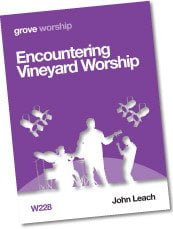What can Anglicans and Vineyard learn from each other?
 Fifty-fifty if you are not role of it, you are probably enlightened of the influence that the Vineyard movement, led by John Wimber, has had on the Church of England. The latest Grove Worship booklet, Encountering Vineyard Worship past John Leach, explores this and assesses how the two traditions relate to one some other.
Fifty-fifty if you are not role of it, you are probably enlightened of the influence that the Vineyard movement, led by John Wimber, has had on the Church of England. The latest Grove Worship booklet, Encountering Vineyard Worship past John Leach, explores this and assesses how the two traditions relate to one some other.
In a fascinating article, Stephen Hunt suggests that the Church building of England is the English language denomination most open to, and therefore most influenced by, Vineyard praxis. This influence, I suggest, is more far-reaching and radical even than he described 20 years agone.
Most notably this has happened through 2 networks: those associated with New Wine (NW), which had its origins in St Andrew's Church, Chorleywood; and Holy Trinity Brompton (HTB). I will refer to this miracle as 'Anglican Vineyard' worship. My aim is to write a friendly critique which encourages u.s.a. to think more deeply about this worship way. I hope that I might inquire some hard questions of it, and possibly help churches which have adopted this model to empathise more clearly what they take done.
Given the influence of these 2 networks, such a critique and understanding is surely essential to empathise what is happening in the Church of England today. (If something merits a chapter of scathing parody by Linda Woodhead and Andrew Brown, it must surely be important!)
John goes on to recount his own first experience of Vineyard worship, and explains the background to its development in the life of John Wimber, also as its adaptation in Anglican settings.
Vineyard worship is a five-stage journeying to lead us into the intimate presence of God. Wimber originally articulated these stages as: The call to worship; Engagement; Expression; Visitation; Giving of substance. Whilst this model has connected as the foundation rock of Vineyard worship, information technology has been refined forth the style. So for case Matt Redman, originally an Anglican worship leader, who was heavily influenced by the Vineyard, has slightly dissimilar names for the five phases: The call to worship; Engagement; Exaltation; Admiration; Intimacy.
It will exist worth taking some time to explore a scrap more deeply the five stages of worship, since neither the words nor the experiences might be familiar to Anglican worshippers. Matt Redman helpfully pads out his titles with more than information:
The phone call to worship uses songs addressed to others so that nosotros are mutually encouraged to requite ourselves to the period of worship ahead. This volition be familiar to more liturgical Christians, although non usually in song.
Engagement occurs when we brainstorm to address God personally; what John described every bit 'the electrifying dynamic of connection to God and to each other.' As this happens the presence of God is manifested among us.
Exaltation is the more celebratory singing which, according to John, we cannot help but offer when we go aware of his presence.
Adoration is the side by side phase, as the songs go more tender. The accent shifts from thanking God or celebrating him to telling him how much we dear him.
Intimacy, the final goal of our worship, is an sensation of God's intimate presence with us. John himself defines intimacy as 'belonging to or revealing one's deepest nature to another (in this case to God), and it is marked by close association, presence, and contact.' Worship leader Brian Doerksen adds, 'People desire to sing intimate songs to God because they say what their hearts have been yearning to say, and many of them have been longing for intimacy their whole lives.' This phase has also been described equally the climax in the love-making of worship, which you might or might not find a helpful motion picture.
Underlying this shape for worship are three core values: intimacy; integrity; and accessibility. Intimacy seems to be about real eye connexion to God; integrity refers to the worship leaders' ain personal middle for worship (the contrary, I suppose, of paid choir members with no faith just an enjoyment of choral music); and accessibility is about the ease with which anyone can bring together in.
Few, I suspect, would want to argue too much with the Vineyard'southward core values in worship. It must be the case that Wimber's positive background in the Friends denomination, along with his negative experiences of Catholicism and traditional Anglicanism, and his work as a church growth consultant, have made intimacy and experiential encounters with God then important to him, since they are and then apparently lacking in the worship of other churches. Typical of Vineyard rhetoric is this from Carl Tuttle:
There is no life for us in much of what traditional Christianity offers us. Autonomously from God's presence, the system and structure of the church including its Bible studies, singing, pedagogy, programmes, and traditions of outward righteousness are only forms without God's presence and power. We need to turn from lifeless forms and begin to draw near to God and kiss his heart through the experience of worship.
In John'southward word, he recognises the importance and the appeal of such an approach. Just it is not without its disadvantages, and John goes on to offer a critique from an Anglican perspective.
The kickoff thing to annotation is that in the Vineyard worship equals singing. It is a wry joke in charismatic circles that after having gathered, prayed, confessed, and so on 'We are now going to have a time of worship.' Simply in the Vineyard there merely is nothing else to worship just singing.
Of course I must generalize hither, but my experience of Anglican Vineyard worship is that many of the ingredients of Anglican worship have become lost. I have been to many services in Anglican churches where we have non confessed our sins, joined in corporate spoken prayer, joined in psalms or canticles, heard Scripture read, celebrated the tenets of our faith together, interceded for anything exterior the 4 walls of the edifice, taken staff of life and wine, joined in the prayer Jesus taught us to pray, or been sent out to work for the kingdom. The worship of well-nigh denominations has evolved to include about if not all of these ingredients, but in Vineyard worship they are notable by their absence. So, more specifically, what is missing?
John and then explores the part and value of liturgy (in the broadest sense), intercession, symbolic action, musical variation and involvement—but I was about stuck past his comments on the role of scripture:
Vineyard churches are zippo if non biblical. Whether or not ane agrees with facets of their interpretation, nobody could claim that they do not take the Bible seriously. Notwithstanding it is ofttimes the case that services exercise not incorporate the reading of Scripture in the way traditionally adept past others. Information technology may be the case that one or 2 verses are used during the sermon, but often without the congregation having heard or read the context. Information technology is certainly not likely that there volition be more than than ane Bible reading, with a balance between Old Attestation, psalms, epistle and gospel. This public reading of Scripture has long been an of import element in the worship of the church building, dating back even to the New Testament itself, and before that to Judaism (Col 4.sixteen). Information technology used to be a joke in Anglican circles that, however heretical the sermon, one could notwithstanding gain spiritual nourishment from the Bible itself and the liturgy of the church. But it is also essential in helping the congregation to be biblically literate and to see the big picture if the Bible is read in meaning chunks, and not only used as a quarry for individual proof texts. Ane thing which marked John Wimber out from US Pentecostalism was his willingness to appoint with biblical and sociological study. He would non, I advise, be pleased with the style in which Scripture is oftentimes used. I am not arguing for a return to conservative evangelical expository preaching as the only valid fashion of treatment the Bible; indeed I have argued the very opposite. But the omission of the public reading of Scripture is, I believe, a loss to the church, and a loss potentially detrimental to its wellness.
John goes on to offering a fascinating reflection on the integration of worship and teaching in the context of Anglican worship which perhaps many Anglicans have not really appreciated. But he too notes the remarkable contribution the Vineyard approach has fabricated to the C of Due east:
Anglican Christians and Christian leaders have indeed experienced more of God in the context of Vineyard conferences and events than they did though their normal Anglican liturgical worship. This quest for an experience of the presence of God has quite rightly get compelling, and leaders long for their congregations to feel more from God than they have earlier. They genuinely believe that to drop the liturgy and focus on the quest for intimacy volition take them further towards achieving this goal, and in many cases it has.
The same appears to exist truthful in terms of evangelism. HTB and NW churches accept proven track records of numerical growth and evangelism, and it appears that this manner is worth adopting simply because it works. The church I nourish, which has grown from seven to around 250 in just over a year, is a example in point. Of course some of the growth is through transfer, although nosotros accept tried to avoid that as much as possible, but a meaning amount appears to be from Christians alienated from churches which did zero for them, but who take now been able to reconnect.
Nosotros noted above Carl Tuttle'southward sweeping condemnation of church life exterior the Vineyard, but the fact is that in many cases he is right. When liturgical worship serves to replace an expectation of the life of the Spirit it is no surprise that it is experienced as a turn-off.
 What is needed, then, might be a artistic synthesis between these two approaches, and in his final chapter, John explores what that might look like.
What is needed, then, might be a artistic synthesis between these two approaches, and in his final chapter, John explores what that might look like.
You tin can order the booklet postal service complimentary in the UK from the Grove website—and I don't think y'all will be disappointed. Information technology is a vital and fascinating read.
Follow me on Twitter @psephizo.Like my page on Facebook.
Much of my work is washed on a freelance footing. If you have valued this post, would y'all considerdonating £1.20 a month to support the production of this web log?
If you enjoyed this, practice share it on social media (Facebook or Twitter) using the buttons on the left. Follow me on Twitter @psephizo. Similar my page on Facebook.
Much of my work is done on a freelance footing. If you have valued this post, you can brand a single or repeat donation through PayPal:
Comments policy: Good comments that appoint with the content of the post, and share in respectful argue, tin add together existent value. Seek first to empathize, then to be understood. Make the most charitable construal of the views of others and seek to acquire from their perspectives. Don't view debate every bit a conflict to win; address the argument rather than tackling the person.
meyersbrestiong1961.blogspot.com
Source: https://www.psephizo.com/life-ministry/what-can-anglicans-and-vineyard-learn-from-each-other/
0 Response to "What can Anglicans and Vineyard learn from each other?"
Post a Comment